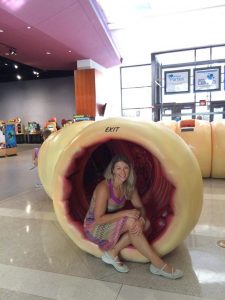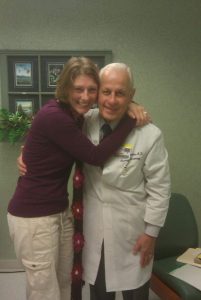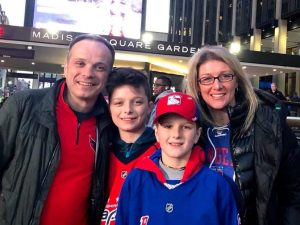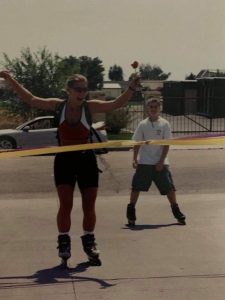As we recognize Colorectal Cancer Awareness Month, its important to know that getting screened for colorectal cancer regularly can help save lives. A colonoscopy is the best way to prevent and detect colon polyps and colon cancers.
Local community member, and GFH patient, Molly McMaster shares her story about why you should talk with your provider about being screened:
“23 and a half years ago I was a college student with some embarrassing stuff going on – blood, bloating, weight loss (Okay, that one wasn’t too embarrassing), vomiting, and abdominal pain. I went to my doctor at school in hopes of a solution, but didn’t “look the part,” so I wasn’t tested for anything more serious. Instead, I was told it was constipation, irritable bowel syndrome, and that I was a stressed-out college student. Fast forward to my arrival at Glens Falls Hospital on a chilly morning in February of 1999, and I was quickly sent in for emergency surgery to remove a tumor that turned out to be colon cancer. I found that out the same day I turned 23 years old.
Back then, I had no idea what a colonoscopy was and had never even heard of colon cancer. I had all the symptoms (according to any list you’ll find), but being in my early 20s, it was never suggested. Then suddenly I was thrust into a world where I was somewhat of a colon cancer expert. I remember being so angry when my doctors told me that I was the only one in the country to be diagnosed so young, maybe even the world. I wanted to do something about it.
The past 23 years have been somewhat crazy. I like to say that I never turn down an opportunity. It started in the summer of 2000, when I in-line skated across the country from Glens Falls, NY to Greeley, CO. My amazing mom followed the whole way at 10 miles per hour in a donated RV, and the entire North Country held me up along the way. Then I ran the New York City Marathon, sponsored by the New York Apple association, and in hopes of continuing to share my story. CoCo, the Colossal Colon, was the next big project – a 40 foot-long, four foot-tall replica of a human colon, complete with polyps, Crohn’s disease, ulcerative colitis, cancer, and even hemorrhoids. The idea was simple – get people talking about colon cancer in a way that was funny, because getting people to talk about it is the first step to getting them screened. In 2003, CoCo traveled to 20 major cities across the United States, making appearances in such places as Yahoo News, Playboy magazine, and the Jimmy Kimmel Show – all places where you may not normally hear about colon cancer. It was awesome…but I knew we weren’t finished! We started a non-profit called The Colon Club to continue to raise awareness of colorectal cancer in out-of-the-box ways, especially in young people.
Our next project came up when I met another young survivor who had been diagnosed at the age of 22. “We should do a calendar,” she said. “We can all show our abdominal scars and tell our stories!” and so The Colander was born – a calendar of young people all diagnosed under the stereotypical age of 50.
Then, the UHL Cross-Checked Colon Cancer in March 2006, when the Adirondack Frostbite invited me to play a shift in honor of the fight against colon cancer. Instead of allowing just the Frostbite, the UHL Commissioner asked if we could do the same through all 14 teams in the United Hockey League. Again, the story made its way into news outlets that wouldn’t normally talk about colon cancer, like ESPN’s Cold Pizza!
Today, and after 10 years as a calendar, the Colondar has been transformed into a full-color magazine called On the Rise, referring to the rise in colon cancer in young adults. The Colossal Colon is now at home in the John P McGovern Museum of Health and Medical Sciences in Houston, Texas, educating hundreds and sometimes thousands of people a day. And after 20 years, I finally published a book about my experience – One Drop Of Rain: Creating a Wave of Colon Cancer Awareness.
Everything has been in the name of colon cancer education. Through it all, I wanted people to see that it’s a disease that can happen to anyone, no matter what their age, skin color or dog’s name. Then, if they present with symptoms or have a concerning family history, they will have heard of colon cancer or a colonoscopy and be able to advocate for themselves. Maybe they won’t have to go through what I did. Colon cancer usually starts as a small polyp in the colon, and can be removed, just by having a colonoscopy. It’s a disease you can prevent before it even turns into cancer, so please, if you are over the age of 45, have a family history or symptoms, please talk to your doctor about when you should get screened. Twenty-two years of talking about colons is a long time. Please help me to make it worth it.
Glens Falls Hospital has been with me through the entire journey. From surgery, to cancer treatment, to helping with rolling to recovery and even building the colossal colon.”
–Molly McMaster

Molly and the ‘Colossal Colon’ at the John P McGovern Museum of Medical & Health Sciences in Houston, TX.

Molly and oncologist Dr. Martelo

Molly and her family – Sergei, Kyril, and Maks

Finished Rolling to Recovery
